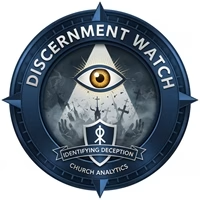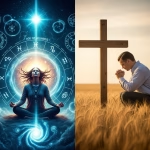Freemasonry: a name that often evokes images of secret handshakes, ancient rituals, and a worldwide brotherhood dedicated to morality and mutual support. With roots stretching back centuries, this fraternal organization attracts individuals from diverse backgrounds, promising personal growth, ethical development, and a strong sense of community. But for Christians, a crucial question arises: Are the teachings and practices of Freemasonry compatible with the core tenets of Christian faith?
This post delves into the heart of Freemasonry, explores foundational Christian doctrines, and highlights the key areas where these two paths diverge significantly.
Understanding Freemasonry: Core Principles
Freemasonry, at its essence, is built on several key ideas and practices that define its character:
- A Universal Brotherhood: Perhaps its most well-known aspect, Freemasonry aims to create a fraternity that transcends religious, political, and social lines. Masons commit to supporting one another, living ethically, and striving for self-improvement.
- Ritual and Symbolism: The Craft (as it’s often called) is rich with elaborate rituals and symbols, many drawing from the tools and traditions of stonemasonry, like the iconic square and compasses. These are intended to teach moral and ethical lessons.
- Emphasis on Moral Development: A central goal for Masons is the cultivation of personal virtue and moral integrity. The teachings encourage members to act with justice, practice charity, and seek enlightenment.
- A Spirit of Tolerance and Inclusivity: Freemasonry generally promotes religious and philosophical tolerance. It allows members to hold their personal beliefs while uniting under a shared umbrella of fraternity, often referencing a “Great Architect of the Universe.”
- Tradition of Secrecy: Certain aspects of Masonic rituals and internal operations are kept private, a practice that has historically fueled both mystique and controversy.
The Bedrock of Christian Faith: Key Doctrines
Christianity, founded on the life and teachings of Jesus Christ as recorded in the Bible, holds to several non-negotiable doctrines:
- The One True God: Christianity is staunchly monotheistic, proclaiming one God who is personal, distinct from His creation, and has revealed Himself specifically (e.g., as Father, Son, and Holy Spirit).
- Salvation Exclusively Through Jesus Christ: A cornerstone of Christian belief is that salvation—being reconciled to God—is achieved solely through faith in Jesus Christ, His atoning death on the cross, and His resurrection.
- The Authority of Scripture: The Bible is considered the inspired, infallible, and ultimate authoritative Word of God, providing the foundation for all matters of faith, doctrine, and moral guidance.
- Exclusive Truth Claims: Christianity teaches that Jesus Christ is “the way, the truth, and the life” and that no one comes to the Father except through Him (John 14:6). This is an exclusive claim about the path to salvation.
- The Reality of Sin and Need for Redemption: Christian doctrine teaches that all humanity is affected by sin, which creates a separation from God. Redemption from this state is a gift from God, made possible only through the work of Jesus Christ.
Where Freemasonry and Christianity Diverge: Fundamental Incompatibilities
When we place the core tenets of Freemasonry alongside Christian doctrine, several significant points of incompatibility emerge:
- Religious Pluralism vs. Exclusive Salvation: Freemasonry’s inclusive approach, allowing members to interpret the “Great Architect” according to their own diverse beliefs, directly conflicts with Christianity’s specific revelation of God and the unique, exclusive role of Jesus Christ as the sole means of salvation.
- The Nature of God: The often vague or deistic concept of a “Supreme Being” in Freemasonry can be interpreted in many ways, contrasting sharply with the Christian understanding of a personal, Trinitarian God who has specifically revealed Himself through Jesus Christ and the Scriptures.
- Secrecy vs. Open Revelation: While Christianity values transparency and the open proclamation of its truths (“what I have said in secret, I have proclaimed from the housetops”), the inherent secrecy surrounding many Masonic rituals and teachings can be problematic for Christians who believe spiritual truth should be open and accountable.
- Path to Improvement/Salvation: Freemasonry emphasizes moral and ethical self-improvement through its teachings and rituals. Christianity, however, teaches that true spiritual transformation and salvation are not achieved by human effort or adherence to moral codes, but are a free gift of God’s grace received through faith in Jesus Christ.
- Ultimate Authority: For Christians, the Bible is the final authority on spiritual truth and moral guidance. Freemasonry draws its moral and philosophical teachings from its own unique rituals, symbols, and traditions, which do not hold the same divine authority for Christians.
Historical Concerns from Christian Denominations
These incompatibilities are not new discoveries. Throughout history, various Christian denominations have expressed serious concerns. Many Protestant denominations and theologians have critiqued Freemasonry. Concerns often revolve around the syncretic religious elements in Masonic rituals, the perception that it offers an alternative path to spiritual enlightenment outside of Christ, and the potential for divided loyalties for Christian members.
Conclusion: A Question of Core Allegiance
While Freemasonry promotes commendable values like brotherhood, charity, and ethical living, its foundational philosophical and religious underpinnings present significant conflicts with core Christian doctrines. The differing views on the nature of God, the means of salvation, the ultimate source of truth, and the exclusivity of Jesus Christ create a fundamental divergence.
For many Christians, these differences are not superficial but strike at the very heart of their faith, leading them to conclude that active participation in Freemasonry is incompatible with an undivided allegiance to Jesus Christ and the teachings of the Bible.
Discover more from discernment.watch
Subscribe to get the latest posts sent to your email.



